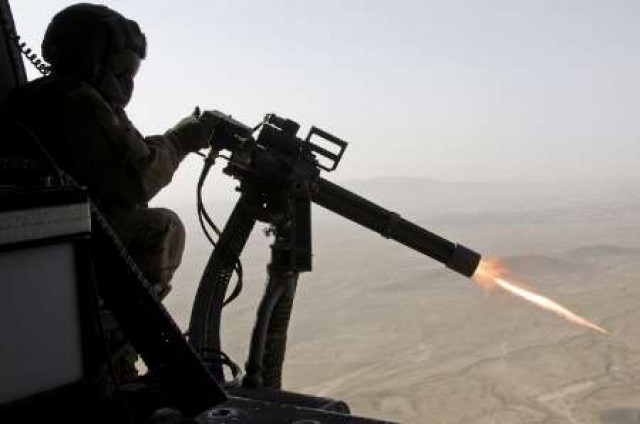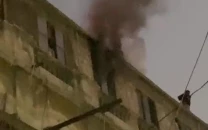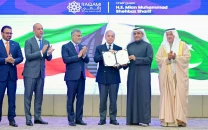Pakistan protests but Nato defends airstrikes
Islamabad says no guarantee over security of supplies if airspace is violated.

Pakistan protests but Nato defends airstrikes
Nato-led International Security Assistance Force (Isaf) involved in air strikes in Pakistan near the Afghan border last week had the authority to defend themselves, a Nato official said on Monday.
The statement comes hours after Pakistan lodged a strong protest with Nato over air strikes by the alliance’s helicopters on its territory near the Afghan border. “Isaf forces must and will retain the authority, within their mandate, to defend themselves in carrying out their mission,” a Nato official told AFP in response.
The attack by the Nato-led Isaf helicopters on Friday left 30 “insurgents” dead, an ISAF statement issued in Kabul on Sunday said.
Pakistan conveyed to Nato forces that it can no longer guarantee the security of Nato supplies after they launched air strikes in the country’s tribal belt, The Express Tribune has learnt. The rare overnight Nato air strikes in North Waziristan drew angry reaction from Pakistan, which has threatened to consider ‘response options’ if immediate steps were not taken to stop such raids.
“Between complete defiance and complete compliance, we have several options to stop Nato forces from violating our sovereignty,” said a senior military official, who wished not to be named. Military and Foreign Office sources say these attacks would make the battle against militancy more unpopular.
“In this situation we cannot guarantee security of the Nato supplies,” said another military official. This has been conveyed to Nato, he added.
Almost three quarter of the supplies to the Nato and Isaf forces stationed in Afghanistan pass through Pakistan. Separately, a statement issued by the Foreign Office spokesman said Pakistan had strongly protested with the Nato forces over the air strikes. “These incidents are a clear violation and breach of the UN mandate under which Isaf operates,” Abdul Basit said in a statement.
He said Pakistan had conveyed its protest to the Nato headquarters in Brussels. “There are no agreed hot pursuit rules. The UN mandate terminates at the Afghan border,” Basit insisted. The spokesman made clear that Nato had been asked not to participate in any military action violating the UN mandate and infringes upon Pakistan’s sovereignty. The spokesman called for capacity enhancement of the country’s armed forces saying Pakistan had ‘boldly and at great cost countered terrorists.’
“Pakistan has always emphasized the need for coordinated and joint action against forces inimical to regional and global peace,” he said. In disregard of Pakistan’s protest, Nato helicopters again violated Pakistan’s airspace on Monday and shelled a village in the Kurram Agency, killing five tribesmen.
Political authorities also confirmed the strike.
Two Nato helicopters killed 30 insurgents on Pakistani soil after a rare manned pursuit across the border from Afghanistan, Nato forces said on Sunday.
The two Apache attack helicopters from the Nato-led International Security Assistance Force (Isaf) crossed the border from eastern Afghanistan on Friday after the insurgents attacked a remote Afghan security outpost in Khost province.
Isaf spokesman Sergeant Matt Summers confirmed that the helicopters had attacked after crossing into Pakistan. He did not comment on which countries' forces were involved, but the United States is the only coalition member that uses Apaches.
The United States regularly uses pilotless drone aircraft for missile strikes in Pakistan's borderlands, known to be a haven for militant groups including the Afghan Taliban who launch cross-border attacks from Pakistan's northwest. However, manned military flights across the border are extremely rare. Isaf said in a statement issued late on Sunday that the helicopters were following its rules of engagement when they crossed into Pakistan.
Two Kiowa helicopters returned to the area on Saturday and killed at least four more insurgents, the statement said.
Isaf was not immediately able to confirm whether the Kiowa helicopters had also crossed the border. US forces make up the majority of Isaf troops in Afghanistan's east. The drone flights have caused resentment in Pakistan, where anti-American feeling runs high. US officials say the pilotless drones are one of the most effective weapons against militants.
The strikes have killed senior Taliban and al Qaeda figures. A new book by veteran US journalist Bob Woodward claims that the Central Intelligence Agency also has a 3,000-man "covert army" of elite, well-trained Afghans, who conduct secret operations in Pakistan, according to the Washington Post. The newspaper obtained an advance copy of the book, which is due for release on Monday. Despite the presence of almost 150,000 foreign troops, violence is at its worst across Afghanistan since US-backed Afghan forces ousted the Taliban in late 2001.
The Taliban-led insurgency has spread out of traditional strongholds in the south and east into once relatively stable areas in the north and west. Apart from the Afghan Taliban, the al Qaeda-linked Haqqani network also operates extensively in Afghanistan's east and has launched a series of bold attacks against foreign forces and Afghan government targets in the past year.
(With additional reporting by Kamran Yousaf in Islamabad and Manzoor Ali in Peshawar)
This article has been revised to reflect the following correction:
Correction: September 27, 2010
The picture previously carried with the article showed a helicopter used for medical evacuations. The picture has been changed.



















COMMENTS
Comments are moderated and generally will be posted if they are on-topic and not abusive.
For more information, please see our Comments FAQ